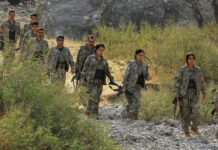
As winter approaches, the humanitarian crisis in Syria is intensifying, particularly in the northwest, where more than 4.4 million displaced people live in dire conditions. Approximately 85% of these individuals reside in makeshift camps, facing rising unemployment, soaring prices for basic goods, and limited access to essential services.
A recent survey conducted by the Syrian Response Coordinators team highlighted urgent needs in over 456 camps in Idlib and the northern Aleppo countryside. The top concerns include securing heating materials, improving water access, repairing damaged tents, and providing firefighting equipment. Heating materials are particularly critical, with 97% of respondents identifying it as their top priority. Additionally, 92% of camps face water shortages and sanitation challenges, while 88% of internal roads require repair.
The situation is exacerbated by a sharp decline in international aid. The United Nations reports that humanitarian funding for Syria is only 26% of what is required. Ramesh Rajasingham, Director of Coordination at the UN’s Office for the Coordination of Humanitarian Affairs (OCHA), stated that over 16 million Syrians need urgent humanitarian assistance. Of these, 4.4 million are being reached monthly, well below the 10.8 million target.
“More than a third of Syrian school-age children are out of school, and levels of acute malnutrition have tripled in the past five years,” Rajasingham warned, emphasizing that the crisis is creating a “lost generation” of children.
The crisis in neighboring Lebanon is adding further strain. As Lebanon faces its own political and economic collapse, along with escalating conflict in Gaza, aid routes into Syria have been disrupted. The Regional Forum of International Humanitarian NGOs in Syria warned that violence in Lebanon is threatening the flow of humanitarian supplies, further limiting the aid reaching Syria’s most vulnerable populations.
Humanitarian organizations have called for an immediate ceasefire in Gaza and Lebanon to allow life-saving aid to reach those in need. The forum also urged the international community to increase financial support for Syria, where basic services, including healthcare, food, and education, are severely underfunded.
In response to the deepening crisis, the US recently announced an additional $535 million in humanitarian aid for Syria. The funding, channeled through international partners, will address key needs such as emergency shelter, food assistance, healthcare, and water supplies. Despite these efforts, the scale of need remains overwhelming.
The US State Department released a statement saying the US has prepared a new aid package for Syria and remains the largest single donor to the country, pledging nearly $1.2 billion in aid this year. They also stated, that the US “continues to fulfill its commitments to the Syrian people,” calling on other donors to “intensify efforts to close the large funding gaps, so that partners can continue to meet the needs of the most vulnerable groups.”
The coming winter poses severe risks for displaced Syrians. A report by the CCCM group, in collaboration with the International Organization for Migration (IOM) and the United Nations High Commissioner for Refugees (UNHCR), revealed that 77% of displacement sites in northwest Syria are at risk of critical shortages in basic services. These camps are highly vulnerable to harsh weather, including snowstorms and floods, which could further devastate the region.
Last year, over 244 camps were flooded, and this winter could see similar, if not worse, conditions. Without immediate international intervention, millions of Syrians will face life-threatening circumstances in the coming months.
As Syria braces for winter, the humanitarian situation is growing more desperate. Aid shortages, compounded by regional instability and inadequate funding, threaten the lives of millions of displaced people. With time running out, humanitarian organizations are calling on the international community to step up support and prevent further disasters.








